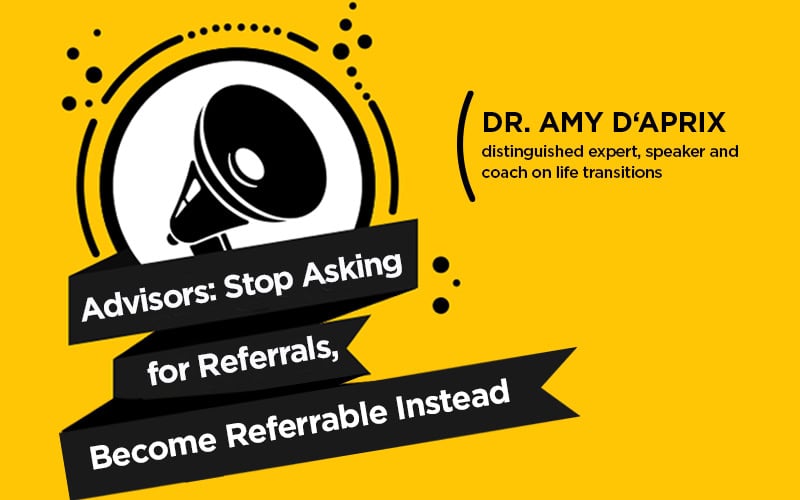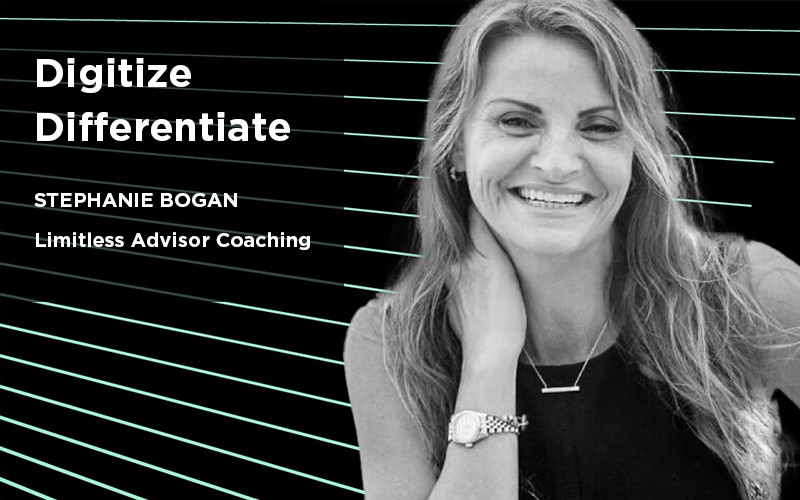One of the biggest ways advisors can make a difference for clients is having the tough conversations that help them prepare for life-changing transitions (retirement, divorce, disability, etc.), while building trust. Clients want to know you “get them,” care about their future and that your relationship goes deeper than the money. That’s what makes you referrable. Here’s how.
Key takeaways:
- It doesn’t take more time to deepen client relationships.
- You can level-up client conversations in as little as :30 seconds.
- You don’t need to be a shrink to find out what makes your clients tick.
- There is one question advisors should ask at the beginning of every client meeting.
- Mastering the three stages of listening can bolster your practice.
- Know your audience: Gen X and Gen Z (millennials) want to co-create with their advisors.
Life-changing transitions like divorce, adult kids moving back in, becoming a caregiver, disability, losing a spouse, remarriage, just retired and worrying about cognitive decline, etc., keep clients up at night. Yet, many advisors struggle with how and when to have those tough conversations.
During a recent episode of The Breakthrough Advisor Podcast, Dr. Amy D’Aprix, a distinguished expert, speaker and coach on life transitions, broached this topic with InsurMark Virtual CMO Jack Martin.
According to Dr. Amy, “Advisors are not always as comfortable knowing how far can I go in that life conversation? You know, how do I actually ask these questions? What I do is just make it easier for them to deepen those relationships.”
What does Dr. Amy really mean by deepening relationships?
“When advisors get into talking about those things that matter to the hearts of clients, there is both the opportunity, obviously, to be able to do better financial planning because it’s based on what your client really needs and wants. But it also means that you’ve got a client for life because people stay with advisors who they feel know them as people and know them beyond their money,” she says.
Instead of asking for referrals, advisors need to become more referrable
Dr. Amy specializes in helping advisors become more referrable. She shared a story of working with an advisor who had just learned her client’s young daughter had died unexpectedly. Thanks to Dr. Amy’s coaching, the advisor boldly said, “If you’d like to talk about your daughter, I’d love to hear about her.”
The client spent the session telling stories about her daughter. She followed up later with an email to the advisor stating, “You have no idea how much that meant to me. Everyone’s afraid to ask me about my daughter because they think it’s going to upset me, but it’s how I’m keeping my daughter alive.”
Those are the types of conversations that deepen relationships and make advisors referrable. Says Dr. Amy, “Now, there is no way that client isn’t a client for life and isn’t going to share and refer. We know women are apt to refer more than men anyway. But advisors spend a lot of time asking for referrals. What they need to do is become more referrable.”
Advisors hesitate to work on deepening relationships based on two misconceptions
There are two roadblocks many advisors have that stand in the way of taking client conversations to a deeper level. One is “I don’t have the time,” and two is “I’m not a therapist.”
“Here’s the good news, it doesn’t take a lot of time. In fact, it doesn’t have to take any more time than you’re spending now, it’s just a little different conversation. And you don’t have to be a therapist, you just have to be a connected human being, and you’re already that,” Dr. Amy says.
Advisors need to know what clients want out of the relationship and deliver on it
As Dr. Amy explains, “One of the things that amazes me that many advisors don’t do is to ask their clients what they want in the relationship. Questions like, are you the kind of client who wants to create with me and we do this together? Are you the kind of client who just wants me to do it, and you get an update every so often? How much communication do you want from me and how do you want it?”
For example, we all know advisors who send out generic, blanket emails to their client lists, without knowing whether or not the client cares to receive the information they’re sending. It says to the client, ‘You’re one of the herd,’ where personalizing those communications is so much more effective. And again, it doesn’t take much time to send a personalized message today, especially since technology makes personalization so easy.
“That’s why I always say to advisors, ‘The best first question you should ask in every meeting is what’s the most important thing to you that we do here today? What’s the most important thing you walk away with today?” Dr. Amy says.
The peak of the customer hierarchy is emotional connection
How do you get there?
Personalization is one way but you have to get to know your clients and what’s important to them before you can take that step. During the podcast, Dr. Amy shared a skillset advisors can use right now to bolster those emotional connections.
As she explains, “We all probably sat through courses on listening or read books or heard something about it. I teach listening in three levels. Level one is ‘listening to reply.’ And people say, of course I know I shouldn’t just listen to give a response, but it’s actually a professional hazard because as professionals, we want to add value.
“’I’m listening for how I can jump in and add value.’ So, you’re going to do that, but hold back. And then level two is ‘listening to the content,’ which obviously is better. You’re listening to the content so you can reply. Level three though is ‘listening to understand.’”
Dr. Amy shared a recent example of a client conversation she experienced firsthand, where the advisor she was coaching shut down a conversation at level two, when could have easily taken the conversation to level three.
The 72-year-old client told the advisor she was “going to Italy to see my mom.” Since the conversation was already going long, and she knew the client needed to get on her way, the advisor said, “Have a great trip and when you get back, let’s connect and we’ll talk.”
Fortunately, Dr. Amy was participating in the conversation and was “listening to understand,” level three. So, she asked, “How’s your mom doing?” The client relayed that her mother suffered from dementia and wasn’t sure she would even recognize her. She also believed it would be the last time she’d ever see her. To which Dr. Amy simply responded, “I can’t imagine how hard your trip is going to be,” and the client agreed.
“That’s level three listening versus level two. It took me how long to do that? Just 30 seconds to have that interaction with the client, and the advisor missed it,” Dr. Amy says. Again, advisors can become referrable when they take those conversations to level three.
Know your audience: Gen X and Gen Z (millennials) want to co-create with their advisors
Gen X (b. 1965 to 1980) and millennials (b. 1981-1996) have different expectations for the advisor-client relationship. According to Martin, “It’s this notion of co-creation. They want to be engaged in the process. They’re not interested in the typical, ‘Here’s your financial planning book, leather bound for you, go read it. Where they are coming from is, ‘I’ve got goals and objectives. I’m reasonably intelligent. I grew up going to bed at night with a PC, so I can search out a lot of the answers you’re going to give me anyway.’”
Martin and the advisors he works with at InsurMark have found that the younger generations want to be active participants in formulating their financial plans.
“They’re thinking, ‘Why don’t we co-create this? Why don’t we mutually say, here’s what I need to know to show I am on track for my goals? Am I making progress or am I off target? What are those things? I really don’t need to know so much. What’s my asset allocation? What’s my balance sheet? That’s the sort of information they are looking for on the road to creating an actionable plan,” Martin explains.
Deepening client relationships doesn’t end there
Check out the podcast for more insight on how to become more referrable and bolster your practice. Martin and Dr. Amy talked legacy planning, the power of niches, how to involve the next generation in client conversations and more. You can listen to the podcast here.
And if you’d like to learn about InsurMark and what our advisor development organization can do to help you grow your practice, contact us at (800) 752-0207 or connect with us online to schedule a discovery call today.
As an ADO – Advisor Development Organization™, InsurMark provides solutions to meet the ever-evolving needs of financial professionals with a mission to protect and enhance the financial security of every home in America.



